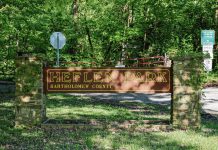Jim Lienhoop, elected Tuesday to become the city’s 37th mayor, has set goals of increasing collaboration among county and state public servants and reducing drug abuse and the resulting property crime.
While he did not have to spend the summer months running for office, Lienhoop has been working to assemble his team of city leaders and develop a plan of action for when he takes office Jan. 1.
“Our goal is to be ready to go,” he said.
The Republican mayor-elect, who defeated incumbent Mayor Kristen Brown by nearly a 2-1 margin in the May Republican primary and was unopposed in Tuesday’s general election, has spent much of the past four months selecting people to fill about 30 positions within various city departments and committees.
Filling those positions accounts for about two-thirds of the work Lienhoop needs to do to transition into his role as mayor.
Although he will not make any official personnel announcements until December, many of the positions will be reappointments, he said.
In the remaining two months before he takes office, Lienhoop said, he wants to complete the transition process by forming connections with city, county and state government leaders.
He already has reached out to the mayors of Seymour and Franklin — who also ran unopposed in the general election — to glean ideas from them and has requested a meeting with the newly elected mayor of North Vernon, Republican Mike Ochs.
At a county level, he said he wants his administration to increase collaboration with Bartholomew County government officials, which is something that has not been a priority in previous years, he said.
That’s why his administration will focus on creating stronger ties between city and county officials, which will increase efficiency at the local government level, Lienhoop said.
Perhaps most important to his own position, the mayor-elect said, he wants to cultivate a relationship with state agencies, such as the Indiana Association of Cities and Towns and the Indiana Economic Development Corp.
Forming partnerships is what government should be about, but the Columbus city government has struggled to successfully create such partnerships in the past, Lienhoop said.
Under his direction, however, he said, the city would see a significant push toward collaboration, which he said will not only benefit city leaders but all Columbus residents.
“Authority … needs to be shared in a government setting,” Lienhoop said. “This isn’t a kingdom. It’s not a corporate environment. It’s a government where we have to work together.”
Top priorities
Once he takes office, Lienhoop said, he immediately will begin focusing on one of the biggest problems plaguing the city: drug abuse.For a city of about 44,000, Columbus has an unusually high rate of property crime, which is directly related to an ongoing drug problem, he said.Early in his term, the mayor-elect wants to work with the Bartholomew County Sheriff’s department to develop new strategies to reduce drug-related crimes.
“That’s probably going to be Job One,” he said.
Aside from addressing the drug problem, Lienhoop said there are three other issues he plans to focus on within the first few months of his term:
Educational opportunities
Economic opportunities
Attracting young professionals
All three are related, Lienhoop said.
About two-thirds of all jobs in the future will require some sort of postsecondary degree, so it is important for local students to understand that their education is not necessarily finished after high school, Lienhoop said.
In order to keep young professionals engaged with the local economy, Lienhoop said, he wants to continue promoting the growth of the manufacturing industry in Columbus and encourage students to pursue the education they will need to build their careers locally.
Long term, Lienhoop said finding a solution to west-side traffic delays caused by the railroad tracks at State Road 46 and Third Street will be a major focus of his administration.
Additionally, he wants to find a way to expand the People Trails along the riverfront, a project that has been a point of controversy in the city council this year.
Even though the Columbus City Council was composed only of members of his own party when he set goals of his term, the addition of two Democrats — Tom Dell and Elaine Wagner — will not change his plans, Lienhoop said.
Though there might be ideological differences on the new council, Lienhoop said he wants to usher in a new era of city leadership based on collaboration, regardless of party differences.
“There are going to be some changes, but they’re both great people, and I’m looking forward to working with them,” he said.
Lienhoop said he wants to assure all residents, even the ones who did not vote for him in May, that he wants their input, even though they did not necessarily have to cast a vote for him Tuesday.
“We’re all playing on the same team now,” he said.
[sc:pullout-title pullout-title=”Jim Lienhoop political timeline” ][sc:pullout-text-begin]
2006: Appointed to the Columbus City Council after councilman Craig Hawes is deployed in the military. Sat in for Hawes twice.
2011: Runs for city council and wins at-large seat, beginning first term as an elected council member in January 2012.
November 2014: Announces his candidacy for mayor
May 2015: Defeats Mayor Kristen Brown by a nearly 2-to-1 margin in the primary election, securing spot on Republican mayoral ticket for general election.
June 2015: No Democratic or independent challenger files a candidacy for mayor, making him mayor-elect.
Tuesday: Wins mayor’s race unopposed.
Jan. 1: Assumes office of mayor.
[sc:pullout-text-end][sc:pullout-title pullout-title=”Election trends” ][sc:pullout-text-begin]
- More than 900 voters in Tuesday’s Columbus general election voted a straight-party ticket. There were 665 Republicans who pulled a party ticket and 259 Democrats.
- Bartholomew County turnout was 16.44 percent, slightly ahead of the 13 to 15 percent predicted early Tuesday by Clerk Jay Phelps.
- Early voting resulted in 1,451 votes cast by noon Monday, which was 28 percent of the 5,132 total number of votes recorded by 6 p.m. Tuesday when the polls closed. The number of early voters was about 90 more than in the 2011 general election.
- Votes cast in Bartholomew County on Tuesday included 27 in the Edinburgh Town Council at-large race. Most voters in Edinburgh live on the Johnson County side of the town, however.
[sc:pullout-text-end]




